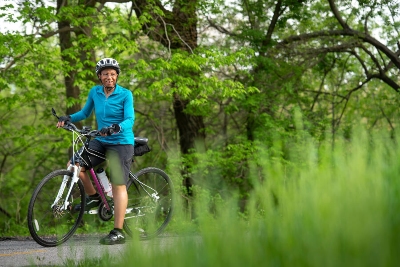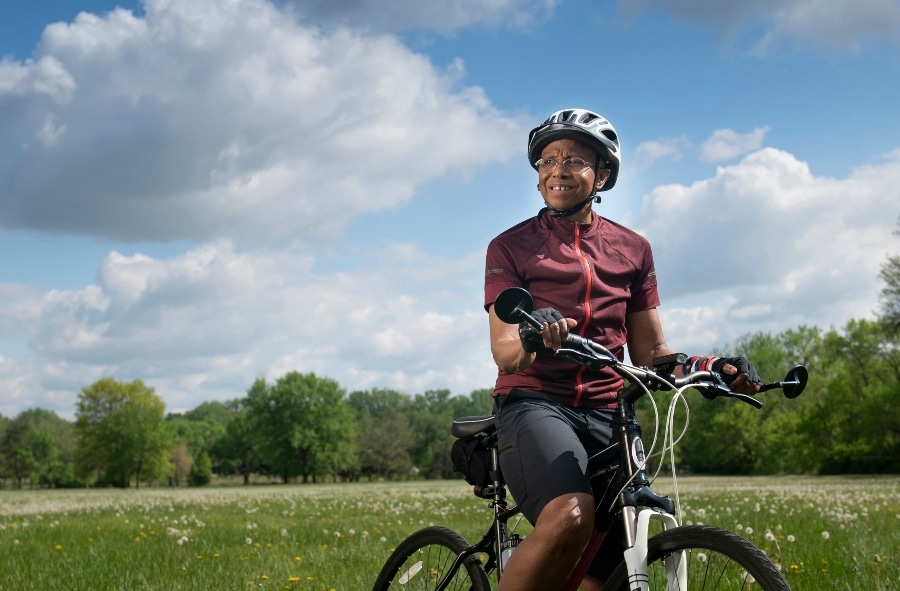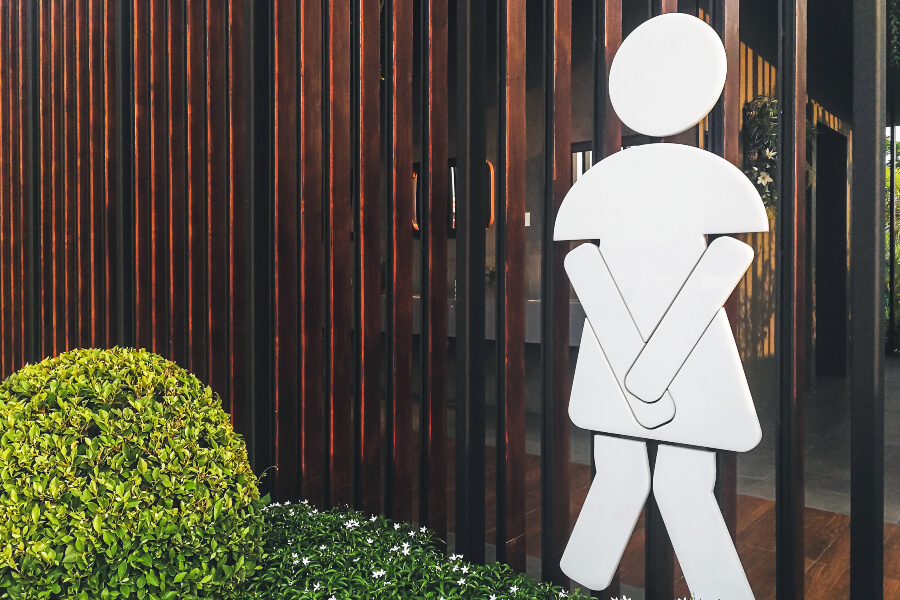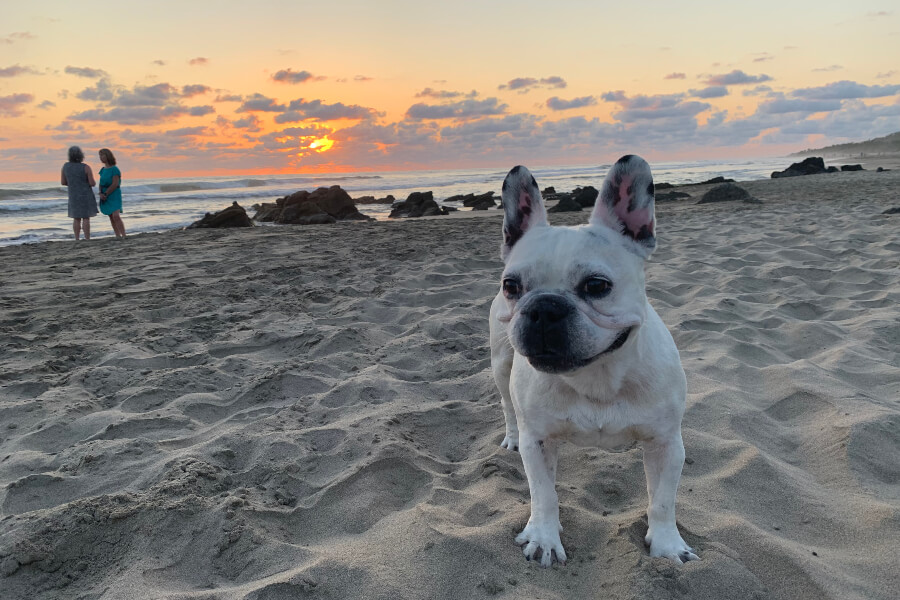This article is one of a three-part series sponsored by DePuy Synthes® and ATTUNE®Knee.
Kittie Weston-Knauer is not the kind of woman who fades into the background. She’s an effusive personality fond of telling anecdotes about her audacious life, and she’s kind of a big deal in the cycling world. At 72, she is the oldest woman on the BMX bike racing circuit, where she’s affectionately known as Miss Kittie. Yep, that’s the sport where cyclists compete around hilly tracks. Plus, for the longest time, she couldn’t go anywhere without making noise.
“Every time I moved, you’d hear my knees,” says Kittie, who spent her professional career as an educator in Des Moines, Iowa. “My students used to tease me all the time when I was principal. They said they knew when I was coming because they’d hear my knees first. I know exactly what they were talking about.”
Oh, those knees. Since she was in her 30s, she had been living in some degree of pain from osteoarthritis, the most common form of arthritis in the knee, which became so severe that bone was grinding against bone. Even as it grew steadily worse, she kept on going—racing, riding bikes for pleasure, and spending time with her active family. “I just pushed through it. That’s one thing my father taught me, `You push through,’” she says, noting that she grew up with five brothers. Kittie is not alone. Osteoarthritis (OA) of the knee is a leading cause of disability in the United States. Patients with knee osteoarthritis generally experience pain, swelling, and unpredictable buckling of the knee. About 80 percent of patients have difficulties with mobility, including 25 percent who cannot perform minor activities of daily living, such as dressing themselves.

But eventually, even this admitted “bad-ass” had to say uncle. In her early 60s, after decades as a BMX racer, her knee issues were truly taking a toll. It hurt to go up and downstairs and to get in and out of her car. After getting an MRI, her journey became clearer. “The MRI told me, `Kittie, your body is riddled with osteoarthritis. Your knees are worse than anything else.’” She realized she couldn’t put it off any longer and had to take action. She had a lot left to look forward to and wanted to truly enjoy it. “Am I supposed to stop living just because I’m over 65? No!” she exclaims.
Kittie turned to the Internet to learn what she would be facing with knee replacements, asking her general practitioner to recommend orthopaedic surgeons and talking to friends who had gone through replacements for their advice and guidance.
Knowing she had to be comfortable with the surgeon, Kittie consulted three different knee surgeons before she found the one she considered right for her. Here are some of the questions she asked that led her to her decision.
Will I get to return to living my life as I have been?
Though everyone’s experience is different and a conversation with your surgeon is critical, this was extremely important to Kittie. She was determined to keep up her BMX racing and her bike rides across her home state of Iowa, which she participated in every summer. “I am an athlete. You might not think of an old woman being an athlete. But that was my number one concern,” she explains. “When I had one surgeon say I needed to give up racing, I told him, `Kiss my grits. I’ll catch you later.’”
What type of knee replacements are out there?
Kittie’s surgeon, who had experience working with amateur and professional athletes, recommended the ATTUNE®Knee for both her knees, based on results he’d seen in patients.
The ATTUNE Knee was the optimal choice for Kittie and her surgeon because of its state-of-the-art design that works with patients’ natural anatomy and its ability to provide maintained stability throughout motion–from everyday activities like getting up from a chair to exercise such as brisk walks and aerobic classes. In a clinical study, patients with the ATTUNE Knee System required significantly less time to meet the criteria to leave the hospital, and they gained a significantly greater range of motion when compared to another leading knee replacement system, both at two and six weeks after surgery.
“I said, ` This body has to work,’” she reports. “`I’m going back out there to compete against women who are young enough to be my kids.’”
How should I get ready for surgery?
Kittie was told that because of her physical condition, she was already well prepared. “My surgeon said, `Keep doing what you’re doing,’” she recalls, noting that the importance of exercise and good nutrition was stressed. One thing she decided to do was attend a program called Joint Camp, offered by many hospitals to ensure that patients know what’s ahead. “Joint camp was extremely helpful,” she says. “The purpose was to give patients the opportunity to learn the ins and outs of surgery, and what to expect before, during, and after. This just validated what my surgeon had told me.”
In December 2014, Kittie had both knees replaced within a span of two weeks. Through rehab, physical therapy, and the kind of discipline and determination she brings to life every day, she was back to riding her bike in a few short months. She also can do the little things that make her everyday life easier–like going up and downstairs and getting in and out of cars. Of course, this is only Kittie’s experience. Other patients may experience different results.
Still riding today and busy with civic activities, such as introducing disadvantaged young people to the joys of cycling, Kittie says her only regret is that she didn’t have her knees replaced earlier. She encourages others with OA knee pain to research what pain relief options are available and appropriate for them. Depending on the severity and frequency of the pain, a surgeon may recommend knee replacement with the ATTUNE Knee as an option.
Kittie says she knows women who aren’t addressing their knee pain, and she wants to tell them this: “Ask yourself, `What kind of life do I want to live? Do I want to be sedentary and just sit around? Is it going to be one where I can really get out there and enjoy what’s going on?’ It’s not OK to be in pain in any circumstances. And if there is a way for you to be whole and healthy, go for it. Truly go for it.”
***
Important Safety Information:
It’s important to remember that the performance of knee replacements depends on age, weight, activity level and other factors. There are potential risks and recovery takes time. People with conditions limiting rehabilitation should not have these surgeries. Only an orthopaedic surgeon can determine if knee replacement is necessary based on an individual patient’s condition.





















0 Comments